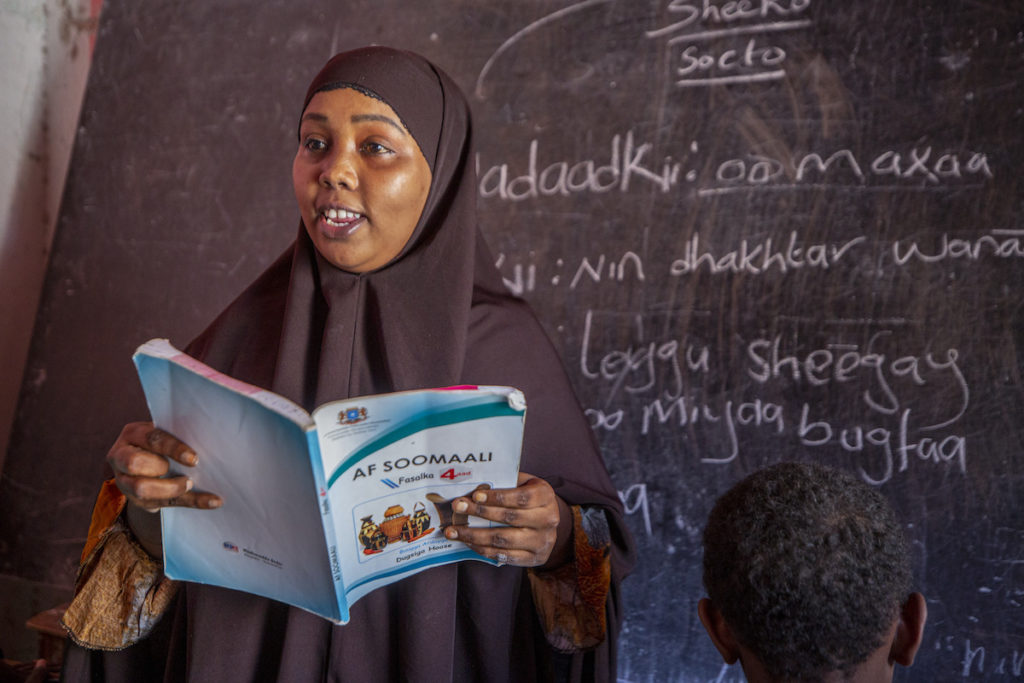A Teacher’s Work is Never Done: A Day in the Life of a Somali Teacher
By Ashley Williams
The role of an educator goes far beyond teaching standard school subjects. In addition to being experts on topics like literacy and numeracy, they also teach children social and emotional skills, create a safe place for them to learn and grow, support extracurricular activities, and much more.
Somali teachers take on even more roles to support their students since decades of conflict, drought and displacement have left their country with a fragile education system.

Bar ama Baro — a USAID-funded project in collaboration with Somalia’s Ministry of Education, Culture, and Higher Education — provides free, accelerated basic education so that out-of-school children have a chance to catch up. A typical Bar ama Baro teacher’s day looks something like this.
5 a.m.
Before Aisha’s workday begins, she starts her day with the morning prayers. Aisha prepares breakfast for her family and gets her children ready for school. As she goes through her morning routine, she is already thinking about the lessons she will teach and how she can make them engaging for her students.
6:30 a.m.
Aisha has a full day ahead of her. Like most Bar ama Baro educators, she teaches in public school for the first half of the day. After her public school students go home, the Bar ama Baro students arrive for their lessons.
The first shift of classes begins at 8 a.m., but since student assembly starts at 7:30 a.m., she makes her way to work bright and early.
On her way to school, she comes across Ahmed, a member of the local community education committee (CEC). The CEC brings together parents, teachers, and community members to promote education and support the students and school. She and Ahmed discuss an unsafe classroom that needs to be repaired and a few out-of-school children whom they hope to enroll within the coming month.
“Teachers and community members work together on a regular basis to ensure the safety of students inside and outside of school. Community members also help us a lot when it comes to retention and preventing students from dropping out. We resolve conflicts and any other issues affecting the school together.” –Abukar Abdikadir, Bar ama Baro teacher in Barawe.
Noon
After the morning classes, Aisha goes home to make lunch for her children and some extended family members who live nearby. She walks part of the way with her fellow teachers, and Aisha mentions that she tried out a new reading activity that she learned in her Bar ama Baro training. The kids loved it! Her colleagues say they will have to try it in their own classes soon.
The Bar ama Baro program supports teacher learning circles in which teachers discuss their techniques and collaborate on issues they have been experiencing in the classroom. Even outside of the formal program, teachers share with each other to support their ongoing professional development.
“We share and exchange experiences during the teacher learning circles. In our last session, we discussed a lot about lesson planning, classroom management, and positive discipline, which really improved my teaching methods over the last year.” –Abdi Abdullahi, Bar ama Baro teacher in Mogadishu.
1:30 p.m.
After lunch, Aisha goes back to school to teach the Bar ama Baro Accelerated Basic Education (ABE) students. The ABE program condenses eight years of schooling into four so that students have the opportunity to reintegrate into the formal school system or earn a government-recognized certificate.
In Somalia, where nearly 3 million people are internally displaced, many children have dropped out of school or were never able to begin. Aisha’s students have many different ability levels, and some are also dealing with the trauma of conflict and displacement.
The social and emotional learning skills – known locally as Learning and Life Competencies – she was trained on by Bar ama Baro have helped her provide a safe, stable environment for her students and teach them how to process their feelings.
“Social-emotional learning (SEL) is an important approach that helps me a lot when it comes to the welfare of my students. It allows me to understand my students better. I notice when they are facing personal challenges, and I can intervene to make sure they are well and ready to learn.” –Hodan Osman, Bar ama Baro teacher in Walaweyn.
4:30 p.m.
Another busy school day has flown by. Aisha stays on after school to facilitate the girls’ club, where they discuss a range of topics such as the importance of education for girls, challenges girls encounter both inside and outside of the schools, and how girls can support each other to report any abuses including bullying.
5:30 p.m.
As Aisha makes her way home from school, she is thinking about how Omar, one of her students, did not come to class today and has been missing school more regularly. She worries about him and decides she will go see his family tomorrow to ask what is keeping him out of class and encourage his attendance.
7 p.m.
After her children go to bed, Aisha starts her lesson planning for tomorrow. She only gets her students in class for a few hours each day and wants to be sure they get the best education possible.
With reporting by Alinor Osman
